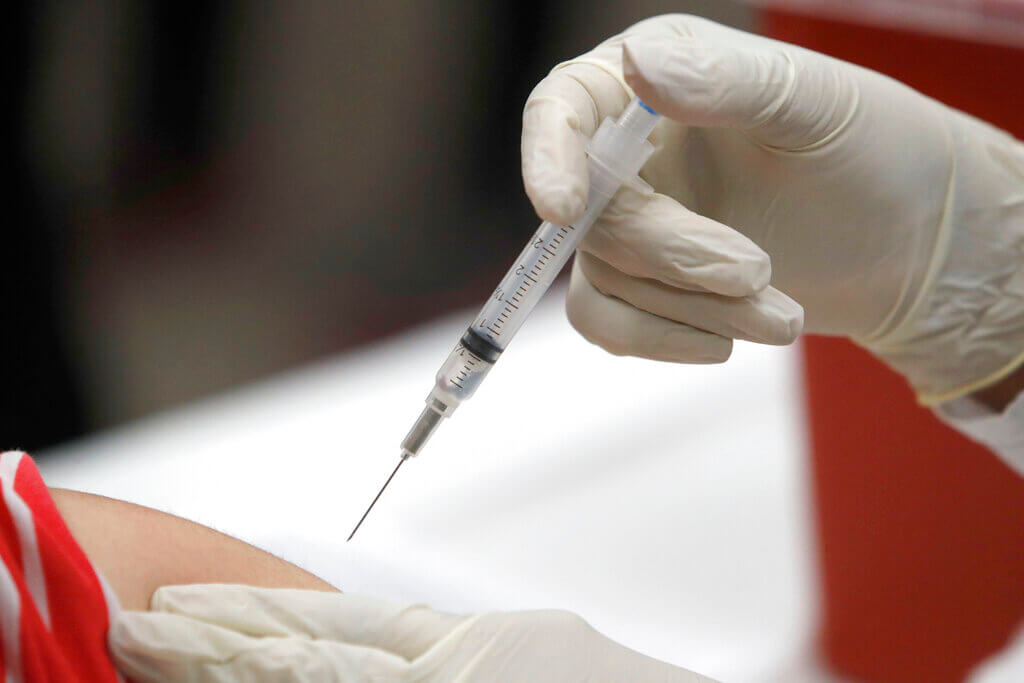
FILE - In this Thursday, Jan. 23, 2020, file photo, a patient receives an influenza vaccine in Mesquite, Texas. Amid all the focus on COVID-19 vaccinations, U.S. health experts have another plea: Don’t skip your flu shot. With U.S. schools and businesses reopened, international travel resuming and far less masking this fall, flu is likely to make a comeback. (AP Photo/LM Otero, File)
Are You Vaccinated (Against The Flu)? It’s not too late to get a flu vaccine!
The holiday rush is almost over, and we haven’t forgotten about New Year’s celebrations. What if you start to sniffle or get a tickle in your throat before the last round of festivities?
If that’s the case, you might want to skip the party and ring in 2022 at home instead. With the ongoing pandemic — not to mention the new Omicron COVID-19 variant — it’s best practice to take precautions.
However, COVID isn’t the only health concern this time of year. The flu is also circulating through Virginia.
An Uncertain Season
Lisa Sollot, a Virginia Department of Health (VDH) respiratory disease coordinator, said there’s currently a lot of uncertainty around this year’s influenza season, and that several factors could play a role in the outcome.
“One factor is COVID-19 mitigation measures. Public health recommendations such as social distancing, wearing a mask indoors, staying home when sick, avoiding crowds, and hand washing all likely contributed to the mild 2020-21 season,” Sollot said. “How well these recommendations are followed this season will likely have an impact on transmission of influenza.”
A second factor centered around the low number of flu cases Virginia experienced last year. She explained that epidemiologists use data from the Southern Hemisphere’s influenza season, which occurs during the Northern Hemisphere’s summer. That data often foreshadows what’s coming to the US during its annual flu season, but scientists in the Northern Hemisphere do not have as much data to analyze this year since numbers were low, making predictions for America more difficult.
A final factor could depend on how many Americans receive their flu shot. Sollot noted that the US distributed a record number of influenza vaccine doses during the 2020-21 season. According to the Centers for Disease Control and Prevention, over 193 million flu vaccine doses went across the country this year, up from about 175 million in 2019-20. Comparatively, only about 111 million flu vaccines went out in 2008-09.
Comparing Flu Seasons
Monitored year-round, the VDH released its annual flu surveillance study, comparing the 2020-21 numbers to 2019-20.
The majority of the 2021 findings fluctuated between no activity and sporadic spread. There was only one week of regional spread, which occurred in August. There was also a single week of local spread, which occurred in September. There were no weeks of widespread concern, and 27 weeks of no activity.
Comparatively, the flu season in 2019-20 saw 19 straight weeks of widespread transmission, starting in December 2019. There was also one week of regional spread, three weeks of local spread, seven weeks of sporadic spread, and 22 weeks of no activity.
The annual report ended Oct. 2, but VDH is already working on gathering data for the next report. As of Dec. 22, Virginia has been at a widespread transmission level for at least two weeks; the first time since 2020. Prior to that, the commonwealth spent seven weeks at the sporadic spread level and had one week of no activity.
The Flu Vaccine
Sollot stressed the importance of getting the flu vaccine.
“When we come into contact with the flu virus, our bodies make antibodies to help your body attack it the next time it sees the virus,” Sollot said. “Some experts have postulated that because there was little flu virus activity last year, natural immunity may be lower than in an average flu season. This makes getting the influenza vaccine this season even more important.”
Brookie Crawford, a public information officer for the VDH’s Central Region, noted that while it’s ideal that people get their flu shot by the end of October, that’s not a hard deadline.
“Adults, especially those older than 65, should not get vaccinated earlier — in July or August — because protection in this group may decrease over time,” Crawford said. “Children can get vaccinated as soon as the vaccine becomes available — even if this is in July or August. For children that need two doses, it is recommended to get the first dose as soon as the vaccine is available because the second dose needs to be given at least four weeks after the first dose.”
Flu season typically peaks in January or February, but often continues through May. Most Virginians can still get the flu vaccine throughout the upcoming winter, and even in the spring. Flu shots can also happen at the same time as COVID vaccines.
“Protection from the flu vaccine occurs within two weeks of vaccination and lasts throughout the flu season,” Crawford said.
Support Our Cause
Thank you for taking the time to read our work. Before you go, we hope you'll consider supporting our values-driven journalism, which has always strived to make clear what's really at stake for Virginians and our future.
Since day one, our goal here at Dogwood has always been to empower people across the commonwealth with fact-based news and information. We believe that when people are armed with knowledge about what's happening in their local, state, and federal governments—including who is working on their behalf and who is actively trying to block efforts aimed at improving the daily lives of Virginia families—they will be inspired to become civically engaged.


VIDEO: Your support matters!
Your support matters! Donate today. @vadogwoodnews Your support matters! Visit our link in bio to donate today. #virginianews #virginia #community...

Op-Ed: Virginia’s new Democratic majorities pass key bills to improve your lives, but will Youngkin sign them?
The 2024 Virginia General Assembly regular session has wrapped up. It was a peculiar session from the outset, with Democratic majorities in the...

Op-Ed: Why Virginia Needs A Constitutional Amendment Protecting Reproductive Freedom
Virginia’s recent election season in 2023 drew in eyes from all over the country. Reproductive freedom was on the line and Virginia remained the...

From the state rock to the state flower, here’s how Virginia got its symbols
Have you ever wondered why the Dogwood is the state flower? Or how the cardinal became the state bird? We’re here to answer those questions and more...

VIDEO: Second-gentleman Douglas Emhoff gives speech on reproductive freedom
Second gentleman, Douglas Emhoff touched on reproductive freedom not only being a woman's issue but "an everyone's issue" during the Biden-Harris...

Glenn Youngkin and the terrible, horrible, no good, very bad night
Election Day 2023 has come and gone, and while there are votes to be counted, one thing is perfectly clear: Virginians unequivocally rejected Gov....





